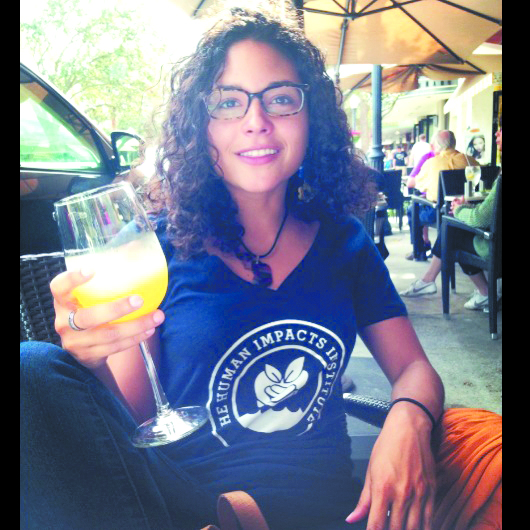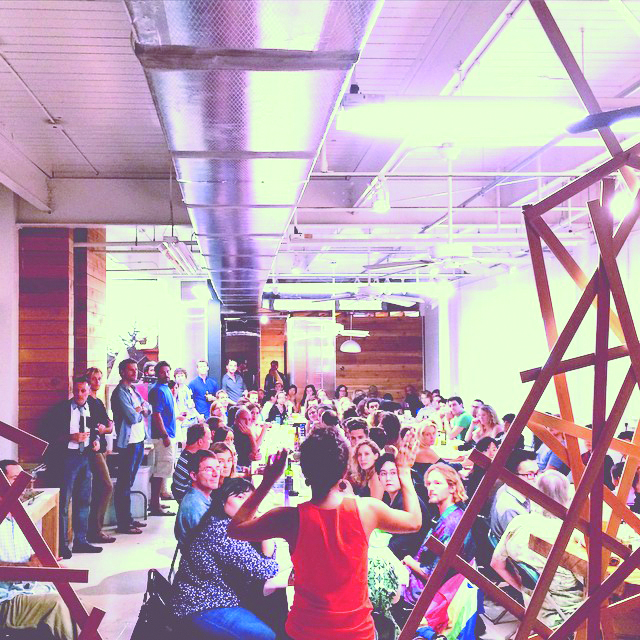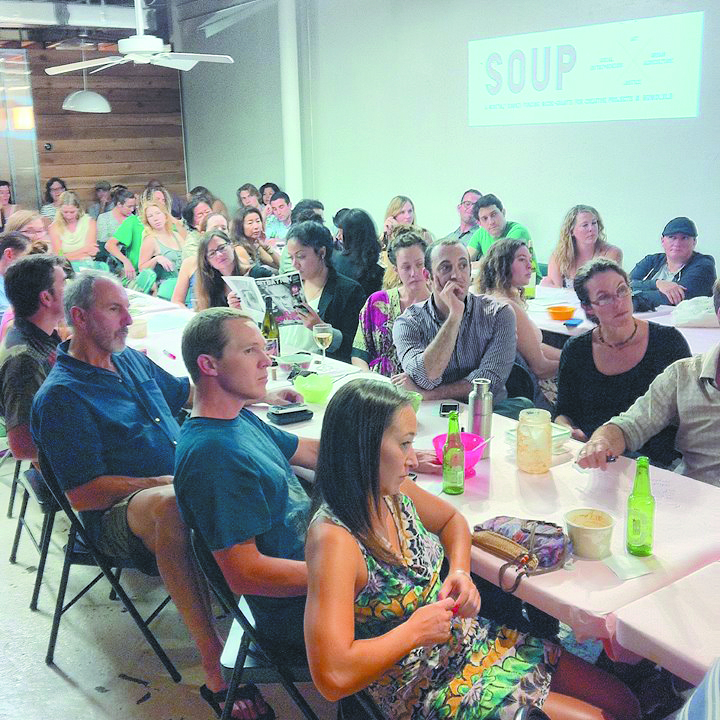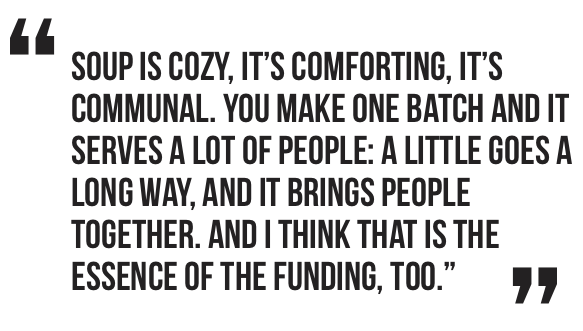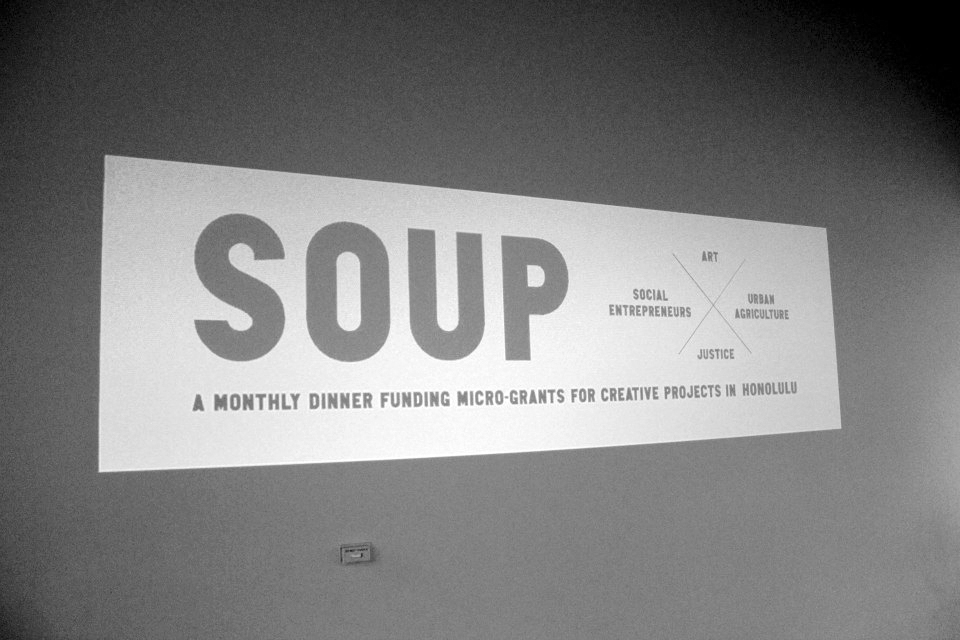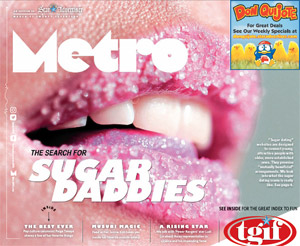Ideas Over Soup

HONOLULU SOUP is a micro-granting dinner that launched last fall and takes place every other month at various locations around town. PHOTO BY RAFAEL BERGSTROM
Within the last few months, Pono Soap has created a website to sell its organic, vegan soaps — the proceeds of which benefit survivors of human trafficking and houseless families. Meanwhile, Urban Farm Hawaii is in the process of building its initial infrastructure for a farm that will be established in Kakaako. These social entrepreneurial endeavors were in part made possible by HONOLULU SOUP, a micro-granting dinner that launched last fall and takes place every other month at various locations around town.
“It’s a place to strike powerful conversations,” explains HONOLULU SOUP organizer and founder Samantha Ruiz. “There already is so much good entrepreneurial work happening around Honolulu, and this is a platform that can still add value in the community … while allowing people to continue the work they’re doing.”
At each event, attendees pay $12 for a dinner of soup prepared by different local chefs and bread from Baker Dudes. As they dine, attendees listen to presentations by local groups — and then vote on which project they’d like to receive funding: $10 from the dinner goes toward the winning project, while the other $2 goes to the chef. The next SOUP takes place from 6 to 8 p.m. March 11 at Real Offi ce Centers co-working space in Chinatown (which is set to open next month). Applications to become one of three presenters are due March 8. (The dinner seeks groups that fulfi ll a rubric that spells out SOUP: service to the community, opportunity for impact, uniqueness and people impacted.) Ruiz is responsible for bringing the event to Hawaii, but the format originated in 2010 in Detroit — and has since expanded to include a network of more than 100 SOUPs throughout the country.
Collectively, these SOUPs have donated hundreds of thousands of dollars to projects focusing on art, urban agriculture, social justice and more.
Ruiz, who is an energy coordinator at University of Hawaii at Manoa, was compelled to launch HONOLULU SOUP when she moved to Hawaii from Florida and noticed substantial momentum around a number of social entrepreneurial and sustainability-focused projects such as community gardens and alternate transportation. “You look around and you see that there is such energy here to do really positive work,” Ruiz says. “I meet impassioned people here all the time.”
Originally from New York, Ruiz attended University of Central Florida, where she was a founding member of an environmental student group called I.D.E.A.S. (Intellectual Decisions on Environmental Awareness Solutions). They founded I.D.E.A.S., Ruiz recalls, as a sort of foil to other groups that dealt with environmental issues. Rather than have a traditional hierarchical structure, they wanted each member to be an active, engaged organizer. (I.D.E.A.S. has since spread to dozens of other college campuses and has a series of smaller chapters developing in Africa.)
In conceptualizing the local iteration of SOUP, Ruiz took that decentralized, communal approach. The selection of groups to participate in SOUP is made by a board, which is comprised of Ruiz and past SOUP winners. And while there is a core organizing team of a few individuals, choices about how to structure the event — including how often and where it would occur — were made in consultation with early attendees. “We try to take a raw democratic process to everything,” Ruiz explains. “If you have an idea you want to contribute to SOUP, come at me. Let me know what you want to do.”
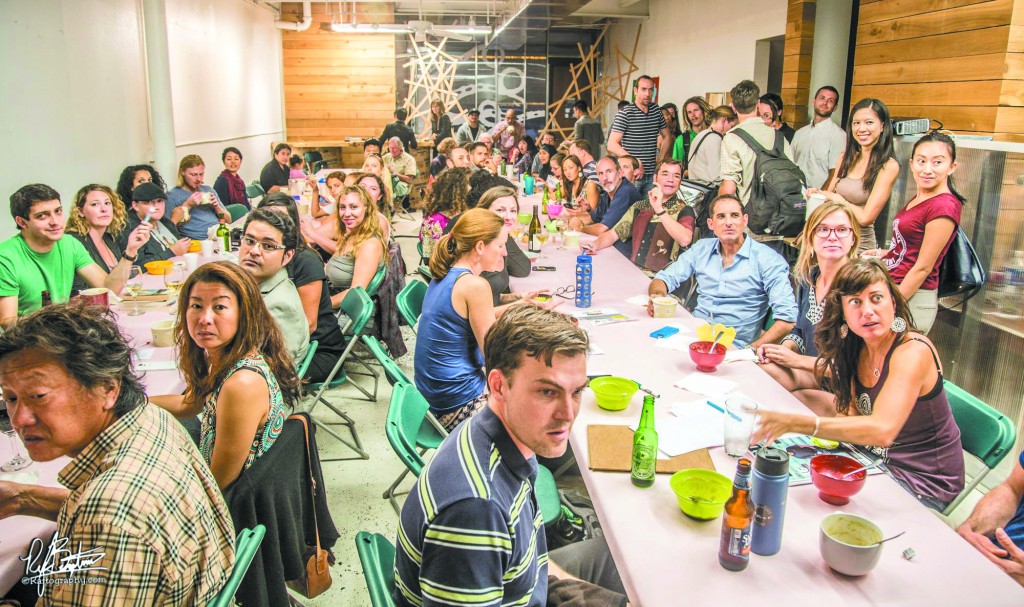
Attendees of the first HONOLULU SOUP,
which was held in November, listen intently to the presentations. PHOTO BY RAFAEL BERGSTROM
For Pono Soap and Urban Farm Hawaii — the winning groups from the two events that have been held so far — SOUP funding has helped get them off the ground. With a goal of repurposing urban lands to provide fresh produce to the community, Urban Farm Hawaii recently has secured a plot of land and plans to begin farming within the next few months. As the winner of the first SOUP that was held in November, Urban Farm received $500. “It will mostly be invested in mending (the land) and will help transform that into a productive landscape,” explains Hunter Heaivilin of Urban Farm Hawaii.
Pono Soap is the for-profit arm of Pacific Alliance to Stop Slavery (PASS), which provides services and advocacy for survivors of human trafficking and raises awareness about the issue. Pono Soap eventually aims to provide jobs for survivors and houseless individuals. The second SOUP more than doubled the amount of attendees from the first, and Pono Soap earned about $1,200 (after sharing some of its winnings with the two other presenters). Its new website (ponosoap.com) enables it to sell products nationally.
“We have been packing boxes ever since,” says PASS executive director and Pono Soap founder Kathryn Xian. “Hopefully, the next step will be getting the name out there, making more soap and doing outreach to the houseless.” But beyond the funding, SOUP also has a number of fringe benefits. Heaivilin says the event also helped Urban Farm Hawaii gain a number of “social connections and folks who have come out of the woodworks to express interest.”
One presenting group had a few SOUP attendees sign on as volunteers, while another had people commit to make donations. “There are so many benefits that come out of putting empowered, ambitious, community-focused people in one room,” Ruiz says. “They want to talk to each other and see how they can combine projects — there is a lot of crosspollination within that room.” In the long term, Ruiz hopes SOUP can serve as a model of participatory budgeting, a process in which communities decide how they want to spend a public budget. Participatory budgeting has been adopted in towns throughout the world, and Ruiz aims to eventually work with legislators to introduce the process to Honolulu.
For now, though, Ruiz is working on expanding the event and wants eventually to create SOUPs statewide. So, why soup? While Ruiz says she can’t speak to the originators’ rationale, she has her own thoughts on the food of choice: “Soup is cozy, it’s comforting, it’s communal. You make one batch and it serves a lot of people: A little goes a long way, and it brings people together. And I think that is the essence of the funding, too.
“HONOLULU SOUP serves as a platform for small startups or even individuals,” Ruiz explains. “Even if they have some crazy, wild idea that they might not be able to get a grant for because they’re not a 501c3, there are still people in the community that will support the idea and move it forward. “So, you know,” she adds, “dream big.”

